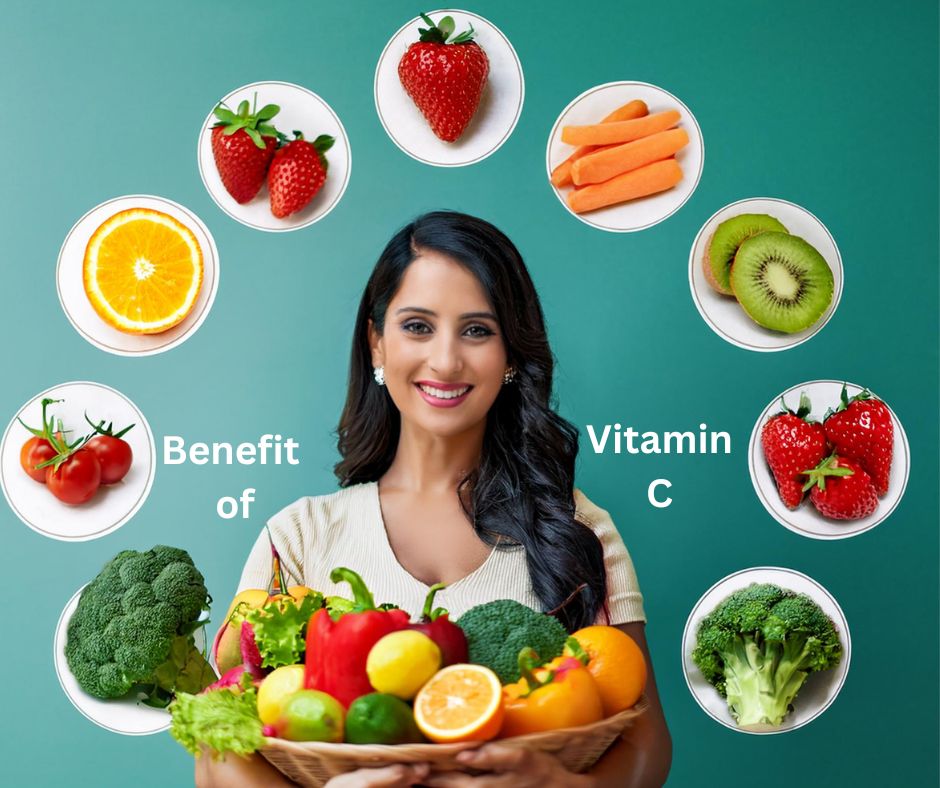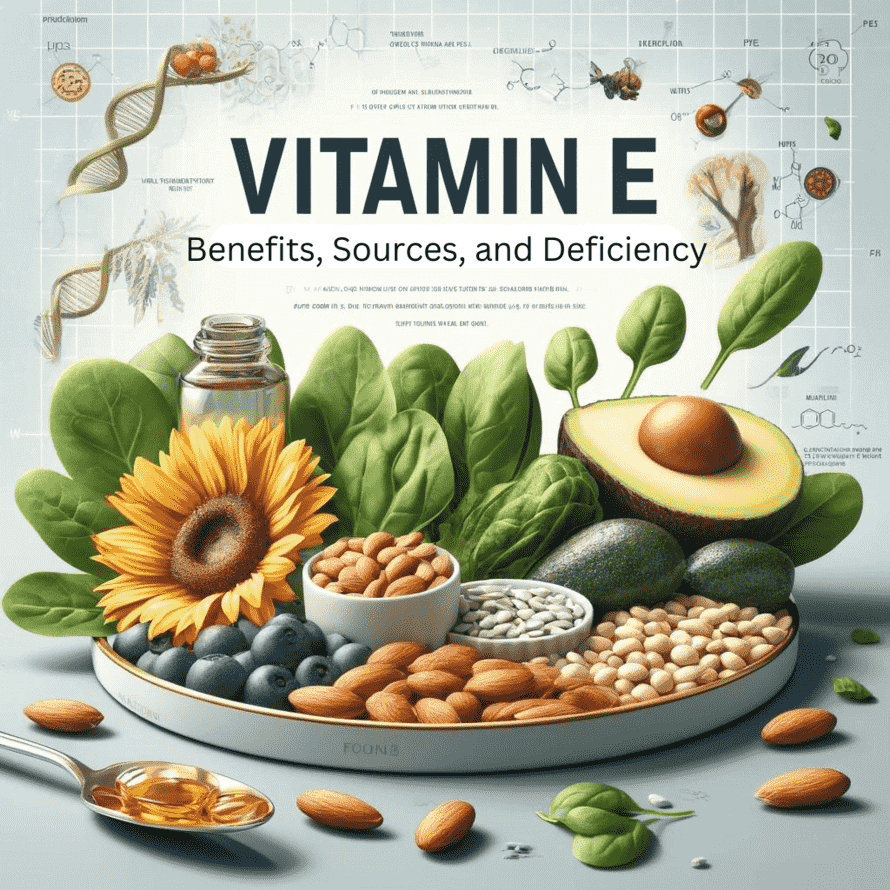
Vitamin C, also known as ascorbic acid, is one of the most important nutrients your body needs to stay healthy. This powerful antioxidant plays a key role in many bodily functions, from boosting your immune system to improving skin health. In this article, we’ll explore the benefits of vitamin C and why you should make sure you’re getting enough in your diet.
Benefits of Vitamin C: Why it is important
What is Vitamin C?
Vitamin C, also known as ascorbic acid, is a water-soluble vitamin that plays a vital role in many of the body’s functions. Unlike fat-soluble vitamins, vitamin C cannot be stored in the body, meaning it needs to be consumed regularly through diet or supplements.
Vitamin C is a potent antioxidant that helps protect cells from damage caused by free radicals. It also plays a key role in collagen production, wound healing, iron absorption, and the maintenance of cartilage, bones, and teeth.
What are health Benefits of Vitamin C
Boosting the Immune System
Vitamin C is perhaps most famous for its immune-boosting properties. It stimulates the production of white blood cells, which are essential for fighting infections. Additionally, vitamin C helps these cells function more effectively and protects them from damage by free radicals. Regular intake of vitamin C can reduce the severity and duration of common colds and other infections.
Supporting Skin Health
Collagen is the main structural protein in the skin, and vitamin C is crucial for its synthesis. Adequate vitamin C intake supports skin elasticity, reduces the appearance of wrinkles, and promotes a youthful complexion. It also aids in wound healing and can help reduce the appearance of scars. Vitamin C’s antioxidant properties also help protect the skin from damage caused by UV radiation and pollution.
Enhancing Iron Absorption
Iron is vital for producing red blood cells and transporting oxygen throughout the body. Vitamin C enhances the absorption of non-heme iron (the type found in plant-based foods) by converting it into a more absorbable form. This is especially important for individuals who follow a vegetarian or vegan diet, as they may be more susceptible to iron deficiency.
Protecting Heart Health
Vitamin C contributes to cardiovascular health in several ways. It helps lower blood pressure, reduces “bad” LDL cholesterol levels, and prevents plaque buildup in the arteries, which can lead to atherosclerosis—a major risk factor for heart disease. By supporting the health of the blood vessels, vitamin C reduces the risk of heart attacks and strokes.
Reducing the Risk of Chronic Diseases
As an antioxidant, vitamin C helps neutralize free radicals—unstable molecules that can cause oxidative stress, leading to chronic diseases like cancer, diabetes, and heart disease. By protecting cells from oxidative damage, vitamin C lowers the risk of these conditions and promotes overall health and longevity.
Supporting Eye Health
Vitamin C is essential for maintaining healthy eyes. It helps prevent cataracts and slows the progression of age-related macular degeneration (AMD), two leading causes of vision loss. By reducing oxidative stress in the eyes, vitamin C supports clear vision and eye health as you age.
Aiding in Weight Loss
Vitamin C can also play a role in weight management. It helps the body convert fat into energy by producing carnitine, a compound that facilitates the breakdown of fatty acids. Additionally, vitamin C-rich foods are often low in calories and high in fiber, making them a great addition to a weight-loss diet.
Enhancing Mood and Reducing Stress
Vitamin C is involved in the production of neurotransmitters like serotonin, which regulate mood and promote a sense of well-being. By lowering cortisol levels—a hormone released in response to stress—vitamin C can help reduce anxiety and improve mood.
Top Food Sources of Vitamin C
Getting enough vitamin C is easy if you include a variety of fruits and vegetables in your diet. Some of the richest sources of vitamin C include:
- Citrus fruits: Oranges, lemons, limes, and grapefruits
- Berries: Strawberries, blueberries, raspberries, and blackberries
- Kiwi: One of the most vitamin C-dense fruits
- Bell peppers: Especially red bell peppers, which contain more vitamin C than oranges
- Broccoli: A cruciferous vegetable high in vitamin C
- Spinach: Along with other leafy greens like kale
- Tomatoes: Including tomato juice and sauce
- Papaya: Another tropical fruit rich in vitamin C
For those who may not get enough vitamin C from their diet, supplements are also an option.However, it’s generally best to obtain nutrients from whole foods whenever possible.
How Much Vitamin C Do You Need?
The Recommended Dietary Allowance (RDA) for vitamin C varies depending on age, gender, and life stage:
- Men (19 years and older): 90 mg per day
- Women (19 years and older): 75 mg per day
- Pregnant women: 85 mg per day
- Breastfeeding women: 120 mg per day
- Smokers: An additional 35 mg per day, due to increased oxidative stress
What are sign and risk factor involved in vitamin c deficiency
Vitamin C deficiency can lead to several health problems, with scurvy being the most severe. Scurvy is characterized by fatigue, swollen gums, joint pain, and poor wound healing. While scurvy is rare in developed countries, mild deficiencies can still occur, leading to symptoms such as:
- Dry, splitting hair
- Rough, dry skin
- Frequent nosebleeds
- Weakened immune response
- Easy bruising
Certain populations are at higher risk of vitamin C deficiency, including smokers, individuals with limited diets, and those with certain medical conditions that affect nutrient absorption.
Can You Take Too Much Vitamin C?
Vitamin C is generally safe, even at high doses, since the body excretes excess amounts through urine. However, taking more than 2,000 mg per day can lead to side effects such as:
- Diarrhea
- Nausea
- Stomach cramps
- Increased risk of kidney stones (in predisposed individuals)
Frequently Asked Questions (FAQs) About Vitamin C
1. Is it better to get vitamin C from food or supplements?
It’s generally better to get vitamin C from food sources rather than supplements. Whole foods provide additional nutrients and fiber that contribute to overall health. However, if you have trouble getting enough vitamin C from your diet, supplements can be a good alternative. Always consult with a healthcare provider before starting any new supplement regimen.
2. Does cooking destroy vitamin C in foods?
Yes, vitamin C is sensitive to heat, and cooking can reduce its content in foods. To preserve vitamin C, try steaming or microwaving vegetables instead of boiling them, and consume fruits and vegetables raw when possible.
3. Can vitamin C help with skin conditions like acne?
Vitamin C can benefit the skin by promoting collagen production, which improves skin elasticity and healing. Its antioxidant properties also help reduce inflammation, which can be beneficial for conditions like acne. Topical vitamin C products can also help reduce acne scars and improve skin texture.
4. What is the role of vitamin C in collagen synthesis?
Vitamin C is essential for the synthesis of collagen, a protein that provides structure to the skin, bones, tendons, and other connective tissues. It acts as a cofactor in the enzymatic reactions that stabilize and cross-link collagen fibers, making them strong and resilient.
5. How does vitamin C interact with other vitamins and minerals?
Vitamin C enhances the absorption of iron, particularly non-heme iron found in plant-based foods. It also works synergistically with vitamin E, another antioxidant, by regenerating vitamin E’s antioxidant capacity after it has neutralized free radicals. This interaction helps maintain a strong defense against oxidative stress.
